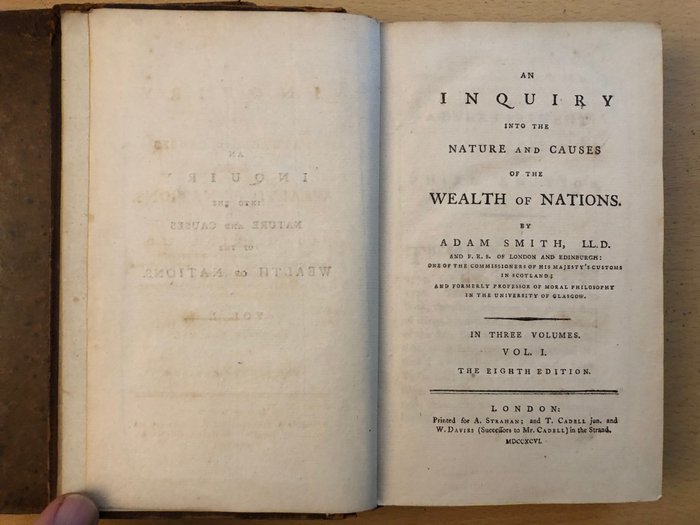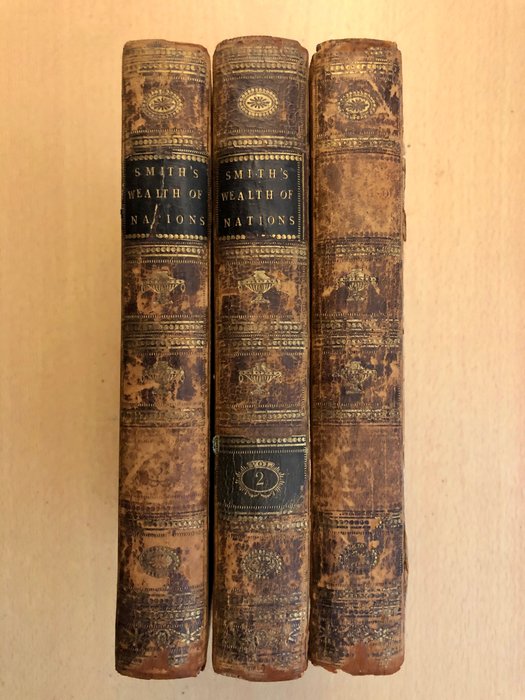Advert Description
Are you interested in this item? This item is up for auction at Catawiki. Please click on "respond to advert" (orange button) to get redirected to the Catawiki website. Catawiki’s goal is to make special objects universally available. Our weekly auctions feature thousands of unusual, rare, and exceptional objects you won’t find in just any store. Title(s): An Inquiry Into The Nature And Causes Of The Wealth Of Nations by Adam Smith LL.D. in 3 Vols
Published: Printed for A. Strahan; and T. Cadell, Jun and W. Davies, 1796
Physical Description: v1 - x, 499p; v2- vi, 518, (5)p; v3 - vii, (1), 465, (49)p
Edition: Eighth Edition
Notes: Index on 49 unnumbered pages at rear of v3
Size: 8vo
Binding:
Binding is speckled calf with decorative gilt spines in six compartments, black and green leather labels gilt.
Upper board volume 1 is detached; all joints cracked in whole or in part, upper board volume 2 a tad wobbly; front inner hinge volume 2 is splitting, front inner hinge volume 3 split; spines are rubbed and crazed in varying degrees, scuffing to head and foot ends with minor chips, bottom band vol 1 lacking, labels chipped or lacking; boards are rubbed and scratched, crazing at edges, scuffed at corners.
Inside:
Internally in very good condition.
Clean almost entirely, just negligible minor spots and brown blemishes through volumes 1 and 2, and just occasional and minor through volume 3, faint liquid stain to the upper margin through the latter half of volume 3 and minor and faint brown staining to the text at pages 290 and 291 of volume 3.
Just negligible minor soiling.
Front end papers volume 3 have minor tears and are detached along with the board, otherwise all tightly held.
This object might be affected by recent changes related to Brexit like additional VAT charges, customs fees, shipping costs and shipping delays. You’ll be responsible for paying these costs in addition to the top bid.
EIGHTH EDITION, which reprints the introductions to the third and fourth editions. Adam Smith (1723-1790) spent ten years in the writing and perfecting of The Wealth of Nations. The book succeeded at once, and the first edition was exhausted in six months. Whether it be true or not, as Buckle said, that the 'Wealth of Nations' was, 'in its ultimate results, probably the most important that had ever been written'. It is probable that no book can be mentioned which so rapidly became an authority both with statesmen and philosophers. The history of economic theory up to the end of the nineteenth century consists of two parts: the mercantilist phase, which was based not so much on a doctrine as on a system of practice which grew out of social conditions; and the second phase, which saw the development of the theory that the individual had the right to be unimpeded in the exercise of economic activity. While it cannot be said that Smith invented the latter theory. His work is the first major expression of it. He begins with the thought that labour is the source from which a nation derives what is necessary to it. The improvement of the division of labour is the measure of productivity. Labour represents the three essential elements—wages, profit and rent—and these three also constitute income. From the workings of the economy, Smith passes to its matter 'stock' which encompasses all that man owns either for his own consumption or the return it brings him. The Wealth of Nations ends with a history of economic development, a definitive onslaught on the mercantile system, and some prophetic speculations on the limits of economic control. Where the political aspects of human rights had taken two centuries to explore, Smith's achievement was to bring the study of economic aspects to the same point in a single work. The Wealth of Nations is not a system, but as a provisional analysis it is completely convincing. The certainty of its criticism and its grasp of human nature have made it the first and greatest classic of modern economic thought.
67537315





